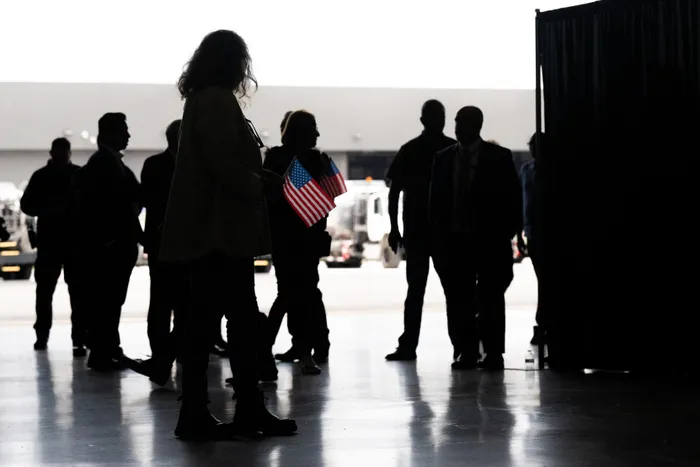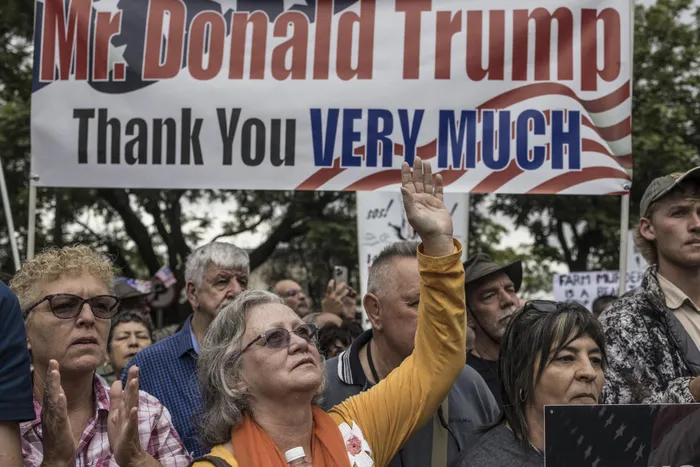SA Government rejects ‘refugee’ label for Afrikaners resettled in US

The first group of Afrikaners from South Africa arriving for resettlement in the US
Image: SAUL LOEB / AFP
A group of 49 South African Afrikaners has officially been granted asylum in the United States and arrived on American soil this past week, prompting concern and condemnation from the South African government.
The US cited ongoing racial discrimination, farm attacks, and threats of expropriation without compensation as the basis for offering refugee protection, calling it a humanitarian response to the “persecution of Afrikaners”.
In a statement, the United States government said, “This tremendous accomplishment, at the direction of Secretary Rubio, responds to President Trump’s call to prioritise U.S. refugee resettlement of this vulnerable group facing unjust racial discrimination in South Africa. We stand with these refugees as they build a better future for themselves and their children in the United States.”
The US added that “no one should have to fear having their property seized without compensation or becoming the victim of violent attacks because of their ethnicity,” noting that more Afrikaners will be welcomed in the coming months.
The move, however, was met with sharp criticism in Pretoria.
Chrispin Phiri, spokesperson for the Ministry of International Relations and Cooperation, confirmed that Deputy Minister Alvin Botes held a “cordial discussion” with US Deputy Secretary of State Christopher Landau on 9 May 2025, following engagements via diplomatic channels.
“The Government expressed concerns with the information conveyed that the United States has commenced with processing alleged refugees from South Africa and will begin resettling these citizens in the United States,” Phiri said.
South Africa pointed to the internationally recognised 1951 Refugee Convention, which defines a refugee as someone with a well-founded fear of persecution based on race, religion, nationality, social group, or political opinion.
“We reiterate that allegations of discrimination are unfounded. The South Africa Police Service statistics on farm-related crimes do not support allegations of violent crime targeted at farmers generally or any particular race,” said Phiri.

The U.S. granted refugee status to 49 white Afrikaners
Image: Marco Longari / AFP
He added that there are sufficient legal structures within the country to address any claims of discrimination and that such claims “do not meet the threshold of persecution required under domestic and international refugee law.”
AfriForum, the civil rights organisation who has previously spoken out about the farm murders in 2024, submitted a formal letter to the Minister of Police detailing a spate of brutal farm attacks between October and December that year.
These included the murder of two women, aged 52 and 82, in Eikenhof; a 68-year-old man in Meyerton stabbed to death during a home invasion; a 32-year-old game farm manager shot dead in Parys; and the murder of a 41-year-old woman in Lydenburg. In Rouxville, a 56-year-old man was shot dead while his wife was abducted and later rescued. In Fouriesburg, a 56-year-old security guard was killed and a farmer hospitalised following a farm attack. A 45-year-old man was also murdered in Hendrina, and his elderly parents brutally assaulted.
AfriForum CEO Kallie Kriel said, “The fact that the first group of Afrikaners has now left the country as refugees is a serious indictment against the ANC-led government, which continues to refuse to condemn calls for violence against Afrikaners, such as ‘Kill the Boer.’” He said the move was the result of state-led discrimination, including the Expropriation Act which allows land seizure without compensation.

Several Afrikaners have previously marched in Pretoria, supporting President Donald Trump and calling for recognition like Israel.
Image: X (Twitter)
“AfriForum is determined, together with our colleagues in the Solidarity Movement, to continue our efforts to help build a future for Afrikaners here at the southern tip of Africa,” said Kriel. “We will continue our safety and cultural infrastructure projects and maintain links with Afrikaners abroad through our Wereldwyd network.”
However, not everyone agrees with the US’s framing of the situation.
Political and international relations analyst, and Director of Surgetower Associates Management Consultancy, Siseko Maposa, said: “It must be unequivocally underscored that individuals seeking refugee status in the US on grounds of persecution in South Africa have done so on demonstrably false, speculative, and misleading premises. A plain reading of the Expropriation Act, the purported catalyst for these claims, reveals no unchecked state power to confiscate land.”
“The Act permits expropriation without compensation only under stringent procedural safeguards, rendering arbitrary seizure legally and practically implausible. Moreover, there exists no empirical evidence, nor any credible government pronouncement, to substantiate claims of systematic, state-tolerated violence against Afrikaners – it is simply a swindle,” he added.
Maposa warned that those who have left under refugee status may face difficulties in returning: “Under the UN Refugee Convention, host nations – in this case the USA – cannot send them back if their life or freedom would be at risk. This is only permissible should the refugees voluntarily return and seek their home country’s protection or choose to resettle, effectively revoking their refugee status.”
He further suggested that the US action was not purely humanitarian: “This entire matter is less about genuine humanitarian concern and more a calculated geopolitical manoeuvre. The US is attempting to artificially inflate perceptions of human rights violations against Afrikaners to justify international pressure and isolate South Africa from its BRICS allies, including Russia, China, and Iran.”
Despite the tension, South Africa has confirmed it will not prevent citizens from leaving the country, citing the constitutional right to freedom of movement.
However, Phiri said the government has sought assurances from the US on the status of the departing individuals — including whether they have been vetted to ensure they have no pending criminal cases.
tracy-lynn.ruiters@inl.co.za
Weekend Argus
